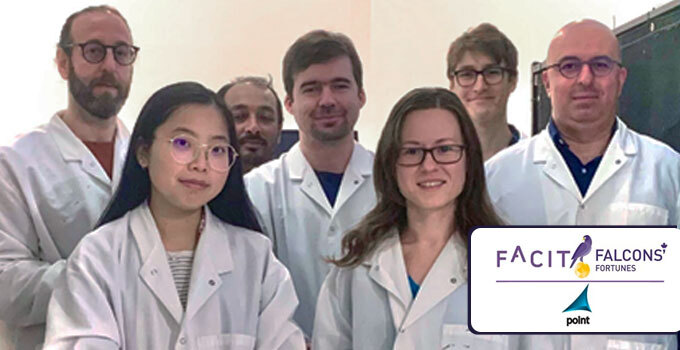Dr. Darren Kraemer and his team will receive $100,000 to advance their laser-based diagnostic technology after winning the FACIT Falcons’ Fortunes competition.
With a cancer patient on the operating table, surgeons have just minutes to make life-changing decisions.
They must decide how to proceed based on what type of cancer it is. And in many cases, surgeons don’t know the cancer type until they can test it during surgery.
Currently, intraoperative testing involves sending a sample to the pathology lab where it will be analyzed under a microscope. Classifying cancers this way is subjective and can be difficult for even the most experienced pathologist – especially within the short intraoperative timeframe. Though molecular testing would give a more definitive diagnosis, existing molecular tests can take hours or days.
But a Toronto-based startup plans to use patented laser technology to help surgeons conclusively classify cancer at a molecular level in as little as 10 seconds.
The team at Point Surgical Inc. believes its technology for identifying and classifying cancer can revolutionize intraoperative diagnostics. And Point Surgical’s pitch was impressive enough to win the 2022 FACIT Falcons’ Fortunes competition, earning the $100,000 Ernsting Entrepreneurship Award.
Following the competition, we spoke to Point Surgical CEO Dr. Darren Kraemer about this innovative technology and what FACIT’s investment will mean for its future.
Tell us about your technology and how it works.
We’ve invented a specialized laser that instantly vaporizes a tiny amount of tissue to liberate the cancer molecules from the tumour – without destroying their delicate molecular structures.
These molecules are identified with a mass spectrometer that counts and sorts the different molecules to record a spectrum, sort of like a fingerprint, unique to each tissue type, and we can then compare this fingerprint to a database of different classes of tumours to see if there is a closely related match. The process takes less than 10 seconds to make a molecular classification.
Where did the idea to apply this laser technology to intraoperative cancer testing come from?
We have a brain surgeon on our team who regularly confronts the limitations of intraoperative diagnosis. With brain cancer, especially, there is very little information in advance about the type of cancer because of the risks of performing pre-operative biopsy of the brain.
So, after years of having traditional pathology done across the hall in the lab, he found that it wasn’t always reliable. And it was always lacking that extra level of molecular information, which is unavailable during the intraoperative timeframe.
As we explored the potential of our technology, he said that having molecular information on hand would make his surgeries better, safer and faster.
Can you talk more about the benefits of this technology for patients, clinicians, and the health system?
On the clinical side, pathologists get objective information and super-fast characterization. That allows surgeons to perform faster operations and make informed decisions. And that helps these clinicians give patients personalized treatment that leads to better outcomes.
Meanwhile, the hospital will save money by minimizing intraoperative time delays, reducing the number of specialized pathologists on-call, and avoiding repeat procedures after inappropriate diagnosis.
What are your next steps from here?
So, the technology is currently pre-clinical, with several proof of concept studies using human tissue published to date. We’re continuing to validate our models with additional tissue types and are developing a portable and affordable prototype which we can place into hospital settings to conduct prospective clinical trials and expound our reference database.
At first, we’re focusing on brain cancer, where we know it can have a range of benefits in tissue characterization, because there is usually no information from a pre-surgery biopsy.
As we progress, we’ll expand the database by adding cancers from other parts of the body, moving beyond just the brain. We also expect our technology will be used to assess where the margins of tumours are, in addition to characterizing them.
Eventually, we’ll develop handheld instruments which surgeons can use in-situ for real-time molecular analysis. And we’ll introduce a product into the clinical office setting, where we see huge applications such as the detection of skin cancer
How will winning the $100,000 award from the FACIT Falcons’ Fortunes competition help you achieve your goals?
This award is huge for us. It will help us buy the equipment we need for the lab and fund studies to build additional evidence for this exciting technology. It will extend our runway and allow us to build even more value, which will in turn be fed back into the medical and research communities.
Although it has only recently been spun into a company, this technology has been under development for over a decade in collaboration with local academic groups. An award like this allows us to accelerate our development ahead of schedule, and we deeply appreciate this support.
Thank you to the judges and to FACIT for believing in us. We’re honoured to have been chosen among so many worthy pitches.
***
Now in its ninth year, FACIT Falcons’ Fortunes is an annual competition featuring six Ontario-based entrepreneurs working in the oncology sector who pitch their innovations to a panel of industry-experienced investors for the $100,000 Ernsting Entrepreneurship Award. The Award is part of FACIT’s Prospects Oncology Fund, which throughout the year also addresses the seed funding gap for early-stage, proof-of-concept projects with commercial potential.

